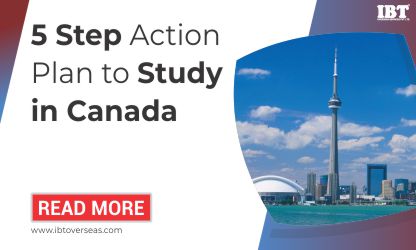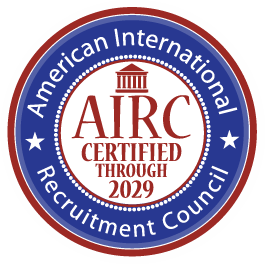5 Step Action Plan to Study in Canada
Hello reader! It’s time to prepare your own 5 step action plan that can magnify your chances of receiving education from Canada.
Now in the nick of time you can enlighten yourself with the right study in Canada information. You might have heard that attaining a Canadian study visa is not that easy.
However, that is why we are here for your assistance. Discover the structured ways to enter Canada in the form of 5 meticulous steps to study in Canada.
We will walk you through all the 5 steps to effortlessly study in Canada.
| Table of Contents |
|
1. 5 Step Action Plan For Study in Canada 1.4 Apply For Your Student Visa 1.5 Prepare For Your Departure 2. FAQ 3. Conclusion |
5 Step Action Plan For Study in Canada
Before diving into the steps you really need to focus more on making your profile strong. As this is the only fruitful way that can make the embassy consider your profile above any other candidate.
1. Research Your Options
The most important thing that you have to keep in mind is that you really need to research the right options of the courses and universities that you can easily select for your future.
It is crucial to check whether a potential school has been approved as a DLI before committing to attending that school. Only DLIs have the ability to take in students from other countries as full-time students. When applying to colleges in Canada, you will be required to have finished the prerequisite courses for the major that you want to pursue.
Students in Canada's postsecondary education system have the ability to switch their majors, but they are strongly encouraged to do their homework in advance to ensure that they choose a course of study that they are really enthusiastic about.
The academic rigor and cultural variety of Canadian institutions have earned them international acclaim. If you have a strong desire to learn more about a subject and go more deeply into it via reading, writing, and other forms of immersion, attending college could be the ideal choice for you.
Typical components of these types of programmes include seminars that serve as venues for interaction between professors and students, as well as lectures that are delivered by distinguished members of the teaching staff. In many programmes, students are expected to do lengthy writing assignments, which is to be expected.
However, in an attempt to better prepare students for the workforce, universities are also asking students to complete projects in groups, engage in internships, and perform field research.
-
Higher education institutions have a more academic approach to teaching, placing a greater focus on intellectual pursuits such as research, lectures, and assignments than do vocational schools. College classes, on the other hand, are often more hands-on and focused on knowledge and abilities that are immediately transferable to the industry.
-
The length of time it takes to complete a university programme and the amount of money it costs are typically longer and more, respectively, than those of a community college.
At various tiers of education, you have a lot of leeway to choose how much time and effort you want to invest in a programme. On the other hand, college may restrict your access to a greater variety of elective courses and majors than you had in high school.
2. Finance Your Studies
Proof of appropriate financial means is required in order to submit an application for a study visa in Canada.
In order to be accepted into a Canadian educational institution, the Immigration, Refugees, and Citizenship Canada (IRCC) requires all international students to provide evidence that they are able to support themselves financially on their own.
When applying for a study visa to study in Canada, international students will be expected to show that they have sufficient financial support for themselves and any dependents they bring with them.
Documentation in writing of a financial aid, such as a scholarship, bursary, loan, or award, may be termed financial security guarantees.
In addition to the requisite tuition payment, a student is obliged to set aside ten thousand Canadian dollars in a guaranteed investment certificate (GIC) at a Canadian bank such as CIBC or SBI Canada.
-
Student Loans to Study in Canada: Federal Student Loans and Private Student Loans.
-
Part-Time Jobs in Canada: The student can only work for 20 hrs in a week.
-
Student Lines of Credit in Canada: CAD 20,000 to CAD 80,000 per year
-
Scholarships to Study in Canada: Merit Scholarships, Government- Funded Scholarships, Financial Scholarships, University Scholarships, Privately- Funded Scholarships and Country-Based Scholarships.
3. Complete Your Application
The third step that you really need to complete your whole application. As it is the only thing that can easily help you become eligible to study in Canada. Consider completing the whole application with all the right details as this is the only thing that can assist you studying in Canada. When you have finished submitting your application to college, you may next start the process of applying for a license.
-
The document known as a "study permit" is Canada's version of a student visa. Using this permission will get you nowhere close to entering Canada. Your permission is not enough; you will also need a visiting visa or electronic travel authorization in order to go.
-
You are free to start the online application procedure as soon as you find out that you will be enrolled in a programme. The Citizenship and Immigration Canada website is the location where all applications for approval are to be filed.
-
Before submitting an application, you'll need the items listed below in your possession. It is possible that the process will take more time if the relevant information for any of these forms is not provided.
-
A letter of acceptance from the institution that was decided upon in advance (DLI). In the event that your offer is conditional, you could be expected to finish a language class in either English or French before commencing your studies in Canada.
-
A demonstration of your identity. Two photographs that may be stored in a passport album, together with a valid passport or another suitable travel document.
-
It is important that you provide documentation of your financial support. You will need to demonstrate that you and your family will be able to maintain your current standard of living in Canada. Documentation for student loans, bank statements, and official letters from sponsors are some examples of such items. You'll need a minimum of ten thousand dollars in Canadian dollars each year to cover your living expenses (not including tuition).
-
It accomplishes the same goal that a personal statement would in terms of persuading immigration authorities in Canada of your desire to pursue tertiary education in their nation. In addition, your article reveals that you are conscious of the responsibilities that come with being a student.
4. Apply For Your Student Visa
The submission of an application for a student visa is possible. It's important that you start working on this as soon as possible. It is impossible for you to enter Canada without a passport, regardless of whether or not your session has already started.
It is essential to organize your study permit as soon as possible since doing so will enable you to apply for a visa. It's also likely that you won't pass the interview the first time you try, which is why you should start the procedure as early as possible before the start date of the programme.
Now that you have verified that your request for a study permit has all of the essential information, you are free to click the "Submit" button. The online application submission is required for your job application.
You have the option of sending a paper copy of your application to the visa application center that is allocated for the nation in which you now live if you are unable to submit your application online for any reason, including a physical disability (VAC).
Because the time it takes to process paperwork varies greatly from country to country, you should be ready to wait anywhere from a few weeks to a few months for everything to be completed.
5. Prepare For Your Departure
If your application is granted and you are not presently residing in Canada, you will be given a travel visa as well as a letter of introduction. If you have these documents with you when you enter Canada, you may be able to receive your study visa there. Upon entering Canada, you need to go to a port of entry in order to get a study permit in person. If your application is approved and you are already in Canada, your study permit will be sent to you. If this is the case, your application will be processed immediately.
-
Consider finding the right accommodation
-
Look out for the right travel and health insurance you require
-
Consider booking your flights and pack your luggage according to that
-
Have a limited amount of Canadian cash with you
-
Download the arrivecan mobile app for great experience
-
Take all the documents such as LOA, medical records and school documents with you.
FAQ
Ques 1) What are the different ways to support yourself financially in Canada?
Ans) The different ways to finance in Canada are Student Loans to Study in Canada, Part-Time Jobs in Canada, Student Lines of Credit in Canada and Scholarships to Study in Canada.
Ques 2) Is it worth it to study In Canada?
Ans) Yes, it is totally worthwhile to study in Canada as their education system is the best among all.
Ques 3) Is it really costly to study in Canada?
Ans) Absolutely not, there are most of the cost saving options to study in Canada. You just have to follow them and then you are good to go. Your chances to study in Canada basically depends on the authenticity of your profile.
Conclusion
Get all your solutions related to Canada study visa by reading this wholesome blog. We strive to provide you with all the essential information that can easily provide you with effective information about studying in Canada. If you have not obtained gainful work within a year of the program's completion, your job status will not impact the date that you are required to begin repaying your student loans. If the student is unable to complete the course within the initially allotted time, the time that was originally allotted for completion can have an additional two years added to it. This blog helps to to understand each and everything in the rightful manner.











